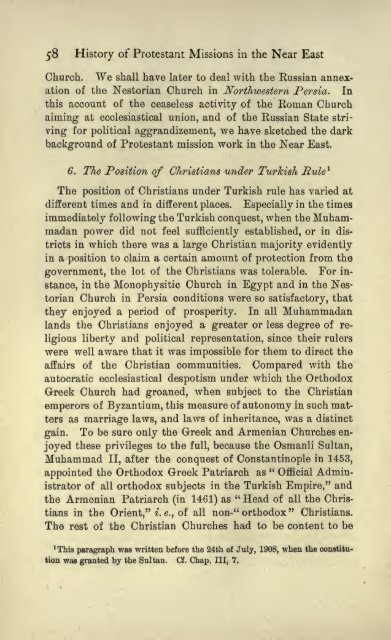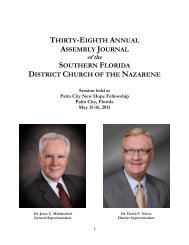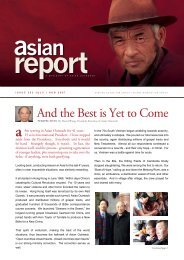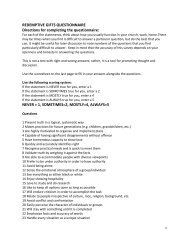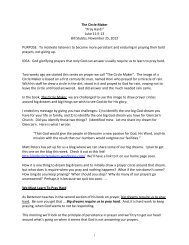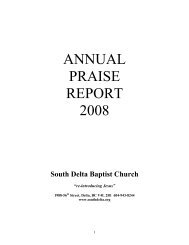- Page 2:
GIFT OF
- Page 7 and 8:
A HISTORY OF PROTESTANT MISSIONS IN
- Page 9 and 10:
Preface TO the Boards of the great
- Page 11 and 12: INTRODUCTION Contents n I. THE MUHA
- Page 13: Contents 9 3. The Church Missionary
- Page 16 and 17: 1 2 Introduction needed for the com
- Page 18 and 19: 14 Introduction The century which f
- Page 20 and 21: 16 Introduction around it. The rout
- Page 22 and 23: l8 History cf Protestant Missions i
- Page 24 and 25: 2O History of Protestant Missions i
- Page 26 and 27: 22 History of Protestant Missions i
- Page 28 and 29: 24 History of Protestant Missions i
- Page 30 and 31: 26 History of Protestant Missions i
- Page 32 and 33: 28 History of Protestant Missions i
- Page 34 and 35: 30 History of Protestant Missions i
- Page 36 and 37: 32 History of Protestant Missions i
- Page 38 and 39: 34 History of Protestant Missions i
- Page 40 and 41: 36 History of Protestant Missions i
- Page 42 and 43: 38 History of Protestant Missions i
- Page 44 and 45: 4o History of Protestant Missions i
- Page 46 and 47: 42 History of Protestant Missions i
- Page 48 and 49: 44 History of Protestant Missions i
- Page 50 and 51: 46 History of Protestant Missions i
- Page 52 and 53: 48 History of Protestant Missions i
- Page 54 and 55: 50 History of Protestant Missions i
- Page 56 and 57: 52 History of Protestant Missions i
- Page 58 and 59: 54 History of Protestant Missions i
- Page 60 and 61: 56 History of Protestant Missions i
- Page 64 and 65: 60 History of Protestant Missions i
- Page 66 and 67: 62 History of Protestant Missions i
- Page 68 and 69: 64 History of Protestant Missions i
- Page 70 and 71: 66 History of Protestant Missions i
- Page 72 and 73: 68 History of Protestant Missions i
- Page 74 and 75: 70 History of Protestant Missions i
- Page 76 and 77: 72 History of Protestant Missions i
- Page 78 and 79: 74 History of Protestant Missions i
- Page 80 and 81: 76 History of Protestant Missions i
- Page 82 and 83: 78 History of Protestant Missions i
- Page 84 and 85: 8o History of Protestant Missions i
- Page 86 and 87: 82 History of Protestant Missions i
- Page 88 and 89: 84 History of Protestant Missions i
- Page 90 and 91: 86 History of Protestant Missions i
- Page 92 and 93: 88 History of Protestant Missions i
- Page 94 and 95: 90 History of Protestant Missions i
- Page 96 and 97: Q2 History of Protestant Missions i
- Page 98 and 99: 94 History of Protestant Missions i
- Page 100 and 101: 96 History of Protestant Missions i
- Page 102 and 103: 98 History of Protestant Missions i
- Page 104 and 105: loo History of Protestant Missions
- Page 106 and 107: 1O2 History of Protestant Missions
- Page 108 and 109: Ill PROTESTANT MISSIONS IN TURKEY A
- Page 110 and 111: 106 History of Protestant Missions
- Page 112 and 113:
1 08 History of Protestant Missions
- Page 114 and 115:
no History of Protestant Missions i
- Page 116 and 117:
112 History of Protestant Missions
- Page 118 and 119:
1 14 History of Protestant Missions
- Page 120 and 121:
1 16 History of Protestant Missions
- Page 122 and 123:
1 18 History of Protestant Missions
- Page 124 and 125:
1 2o History of Protestant Missions
- Page 126 and 127:
122 History of Protestant Missions
- Page 128 and 129:
1 24 History of Protestant Missions
- Page 130 and 131:
126 History of Protestant Missions
- Page 132 and 133:
128 History of Protestant Missions
- Page 134 and 135:
130 History of Protestant Missions
- Page 136 and 137:
132 History of Protestant Missions
- Page 138 and 139:
134 History of Protestant Missions
- Page 140 and 141:
1 36 History of Protestant Missions
- Page 142 and 143:
138 History of Protestant Missions
- Page 144 and 145:
140 History of Protestant Missions
- Page 146 and 147:
142 History of Protestant Missions
- Page 148 and 149:
1 44 History of Protestant Missions
- Page 150 and 151:
146 History of Protestant Missions
- Page 152 and 153:
148 History of Protestant Missions
- Page 154 and 155:
1 50 History of Protestant Missions
- Page 156 and 157:
152 History of Protestant Missions
- Page 158 and 159:
154 History of Protestant Missions
- Page 160 and 161:
1 56 History of Protestant Missions
- Page 162 and 163:
158 History of Protestant Missions
- Page 164 and 165:
160 History of Protestant Missions
- Page 166 and 167:
162 History of Protestant Missions
- Page 168 and 169:
164 History of Protestant Missions
- Page 170 and 171:
1 66 History of Protestant Missions
- Page 172 and 173:
i68 History of Protestant Missions
- Page 174 and 175:
170 History of Protestant Missions
- Page 176 and 177:
172 History of Protestant Missions
- Page 178 and 179:
1 74 History of Protestant Missions
- Page 180 and 181:
176 History of Protestant Missions
- Page 182 and 183:
178 History of Protestant Missions
- Page 184 and 185:
180 History of Protestant Missions
- Page 186 and 187:
182 History of Protestant Missions
- Page 188 and 189:
184 History of Protestant Missions
- Page 190 and 191:
1 86 History of Protestant Missions
- Page 192 and 193:
i88 History of Protestant Missions
- Page 194 and 195:
igo History of Protestant Missions
- Page 196 and 197:
192 History of Protestant Missions
- Page 198 and 199:
194 History of Protestant Missions
- Page 200 and 201:
196 History of Protestant Missions
- Page 202 and 203:
198 History of Protestant Missions
- Page 204 and 205:
2OO History of Protestant Missions
- Page 206 and 207:
202 History of Protestant Missions
- Page 208 and 209:
204 History of Protestant Missions
- Page 210 and 211:
206 History of Protestant Missions
- Page 212 and 213:
208 History of Protestant Missions
- Page 214 and 215:
2io History of Protestant Missions
- Page 216 and 217:
212 History of Protestant Missions
- Page 218 and 219:
214 History of Protestant Missions
- Page 220 and 221:
2i6 History of Protestant Missions
- Page 222 and 223:
218 History of Protestant Missions
- Page 224 and 225:
220 History of Protestant Missions
- Page 226 and 227:
222 History of Protestant Missions
- Page 228 and 229:
224 History of Protestant Missions
- Page 230 and 231:
226 History of Protestant Missions
- Page 232 and 233:
228 History of Protestant Missions
- Page 234 and 235:
230 History of Protestant Missions
- Page 236 and 237:
232 History of Protestant -Missions
- Page 238 and 239:
234 History of Protestant Missions
- Page 240 and 241:
236 History of Protestant Missions
- Page 242 and 243:
238 History of Protestant Missions
- Page 244 and 245:
240 History of Protestant Missions
- Page 246 and 247:
242 History of Protestant Missions
- Page 248 and 249:
244 History of Protestant Missions
- Page 250 and 251:
246 History of Protestant Missions
- Page 252 and 253:
248 History of Protestant Missions
- Page 254 and 255:
250 History of Protestant Missions
- Page 256 and 257:
252 History of Protestant Missions
- Page 258 and 259:
254 History of Protestant Missions
- Page 260 and 261:
256 History of Protestant Missions
- Page 262 and 263:
258 History of Protestant Missions
- Page 264 and 265:
260 History of Protestant Missions
- Page 266 and 267:
262 History of Protestant Missions
- Page 268 and 269:
264 History of Protestant Missions
- Page 270 and 271:
266 History of Protestant Missions
- Page 272 and 273:
268 History of Protestant Missions
- Page 274 and 275:
270 History of Protestant Missions
- Page 276 and 277:
272 History of Protestant Missions
- Page 278 and 279:
274 History of Protestant Missions
- Page 280 and 281:
276 History of Protestant Missions
- Page 282 and 283:
278 History of Protestant Missions
- Page 284 and 285:
280 History of Protestant Missions
- Page 286 and 287:
282 History of Protestant Missions
- Page 288 and 289:
284 History of Protestant Missions
- Page 290 and 291:
286 History of Protestant Missions
- Page 292 and 293:
288 History of Protestant Missions
- Page 294 and 295:
290 History of Protestant Missions
- Page 296 and 297:
292 History of Protestant Missions
- Page 298 and 299:
294 History of Protestant Missions
- Page 300 and 301:
296 History of Protestant Missions
- Page 302 and 303:
298 History of Protestant Missions
- Page 304 and 305:
300 History of Protestant Missions
- Page 306 and 307:
302 History of Protestant Missions
- Page 308 and 309:
304 History of Protestant Missions
- Page 310 and 311:
306 History of Protestant Missions
- Page 312 and 313:
308 History of Protestant Missions
- Page 314 and 315:
31 o History of Protestant Missions
- Page 316 and 317:
312 History of Protestant Missions
- Page 318 and 319:
314 History of Protestant Missions
- Page 320 and 321:
316 History of Protestant Missions
- Page 322 and 323:
318 History of Protestant Missions
- Page 324 and 325:
320 History of Protestant Missions
- Page 326 and 327:
322 History of Protestant Missions
- Page 328 and 329:
324 History of Protestant Missions
- Page 330 and 331:
326 History of Protestant Missions
- Page 332 and 333:
328 History of Protestant Missions
- Page 334 and 335:
33 History of Protestant Missions i
- Page 336 and 337:
332 History of Protestant Missions
- Page 338 and 339:
334 History of Protestant Missions
- Page 340 and 341:
336 History of Protestant Missions
- Page 342 and 343:
338 History of Protestant Missions
- Page 344 and 345:
34-O History of Protestant Missions
- Page 346 and 347:
History of Protestant Missions in t
- Page 348 and 349:
344 History of Protestant Missions
- Page 350 and 351:
346 History of Protestant Missions
- Page 352 and 353:
348 History of Protestant Missions
- Page 354 and 355:
350 History of Protestant Missions
- Page 356 and 357:
352 History of Protestant Missions
- Page 358 and 359:
354 History of Protestant Missions
- Page 360 and 361:
356 History of Protestant Missions
- Page 362 and 363:
358 History of Protestant Missions
- Page 364 and 365:
3&o History of Protestant Missions
- Page 366 and 367:
362 History of Protestant Missions
- Page 368 and 369:
364 History of Protestant Missions
- Page 370 and 371:
366 History of Protestant Missions
- Page 372 and 373:
1 368 History of Protestant Mission
- Page 374 and 375:
37 o History of Protestant Missions
- Page 376 and 377:
372 History of Protestant Missions
- Page 378 and 379:
374 History of Protestant Missions
- Page 380 and 381:
376 History of Protestant Missions
- Page 382 and 383:
378 History of Protestant Missions
- Page 384 and 385:
380 History of Protestant Missions
- Page 386 and 387:
382 History of Protestant Missions
- Page 388 and 389:
384 History of Protestant Missions
- Page 390 and 391:
386 History of Protestant Missions
- Page 392 and 393:
388 History of Protestant Missions
- Page 394 and 395:
390 History of Protestant Missions
- Page 396 and 397:
392 History of Protestant Missions
- Page 398 and 399:
394 History of Protestant Missions
- Page 400 and 401:
396 History of Protestant Missions
- Page 402 and 403:
398 History of Protestant Missions
- Page 404 and 405:
400 History of Protestant Missions
- Page 406 and 407:
402 History of Protestant Missions
- Page 408 and 409:
404 History of Protestant Missions
- Page 410 and 411:
406 History of Protestant Missions
- Page 412 and 413:
408 History of Protestant Missions
- Page 414 and 415:
41 o History of Protestant Missions
- Page 416 and 417:
THOUGH VIII SUMMARIES AND STATISTIC
- Page 418 and 419:
414 History of Protestant Missions
- Page 420 and 421:
416 History of Protestant Missions
- Page 422 and 423:
418 History of Protestant Missions
- Page 424 and 425:
420 History of Protestant Missions
- Page 427 and 428:
ABADIYE, 204 Abassides, The, 35, 59
- Page 429 and 430:
Index 425 Bishop, Mrs. Isabella Bir
- Page 431 and 432:
Index 427 Ford, Miss, 207 Fossum, 3
- Page 433 and 434:
Index 429 Lebanon, The, 47 f, Khart
- Page 435 and 436:
; Nestorians, Index 431 difficultie
- Page 437 and 438:
Index 433 St. John, German Hospital
- Page 439:
Index 435 Victoria Hospital, The, i
- Page 443:
(07 4927^7 / o I? -r UNIVERSITY OF


